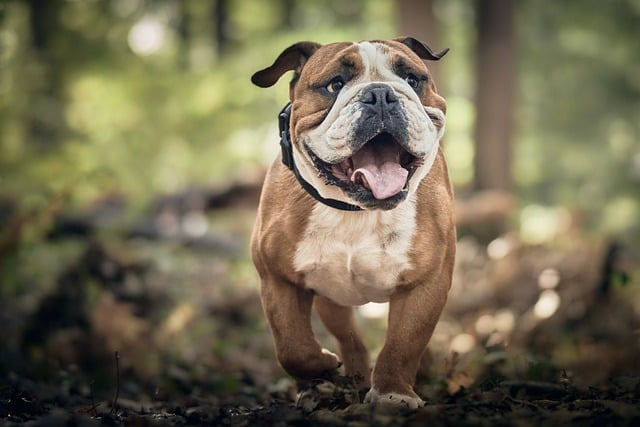If you are a dog owner, you may have noticed your furry friend’s unpleasant breath at some point. While bad breath is a common issue in dogs, it is often overlooked or ignored. However, it could be a sign of an underlying health problem that requires attention from a veterinarian.
In this article, we will explore the reasons why your dog might have bad breath and what you can do to prevent and treat it. We will also discuss the importance of maintaining good oral hygiene for your dog and how it can impact their overall health. So let’s dive into the world of pet dental care and learn more about why your dog has bad breath.
What is Bad Breath in Dogs?
Bad breath, also known as halitosis, is a common issue in dogs and can occur at any age. It is characterised by a foul odour coming from the mouth of your furry friend. While it may seem like a minor problem, bad breath should not be ignored as it could be an indication of an underlying health issue.
In most cases, bad breath in dogs is caused by poor oral hygiene. Just like humans, dogs need proper dental care to maintain good oral health. If left untreated, bacteria and plaque can build up in their mouth, leading to an unpleasant smell.
However, there are other reasons why your dog may have bad breath. Some common causes include digestive issues such as gastrointestinal diseases or food allergies. Kidney disease can also cause bad breath in dogs due to the build-up of toxins in the body. Additionally, respiratory issues and diabetes can also contribute to bad breath.
Causes of Bad Breath in Dogs

There are various factors that can contribute to bad breath in dogs, and it is essential to identify the root cause to effectively treat and prevent it. Some common causes of bad breath in dogs include:
Poor Oral Hygiene
Poor oral hygiene is the leading cause of bad breath in dogs. If your dog’s teeth are not regularly brushed, plaque and tartar can build upon their teeth, leading to bacteria growth and a foul smell. Additionally, food particles stuck between their teeth can also contribute to bad breath.
To prevent this, it is essential to brush your dog’s teeth regularly with a pet-friendly toothpaste and schedule regular dental cleanings with your veterinarian. Chewing on dental treats and toys can also help remove plaque and keep their teeth clean.
Diet
Your dog’s diet can also play a significant role in their breath odour. Certain foods may leave an unpleasant smell in your dog’s mouth, causing bad breath. Additionally, if your dog is not getting enough water, they may become dehydrated, leading to dry mouth and bad breath.
To prevent this, make sure your dog has access to clean drinking water at all times. Also, avoid giving them table scraps or sugary treats that can contribute to plaque build-up in their mouth.
Dental Disease
Dental diseases such as periodontal disease and gingivitis are common causes of bad breath in dogs. These conditions occur when bacteria and plaque build-up along the gum line, causing inflammation and irritation. If left untreated, it can lead to tooth loss and severe infections.
Regular dental check-ups with your veterinarian can help identify any signs of dental disease early on and prevent further complications. Your vet may also recommend professional dental cleaning to remove plaque and tartar build-up.
Digestive Issues
Digestive issues such as gastrointestinal diseases or food allergies can also cause bad breath in dogs. These conditions affect the digestive system, leading to an imbalance of bacteria in the gut, which can contribute to bad breath.
If your dog is experiencing chronic bad breath along with other symptoms such as vomiting or diarrhoea, it is essential to consult with your veterinarian for proper diagnosis and treatment.
Respiratory Problems
Respiratory problems such as infections, sinus issues, or nasal foreign bodies can also cause bad breath in dogs. These conditions can lead to mucus build-up and inflammation, resulting in an unpleasant smell from the mouth.
If your dog is showing signs of respiratory issues such as coughing, sneezing, or difficulty breathing, it is important to seek medical attention from your veterinarian. They can perform a thorough examination and prescribe appropriate treatment to alleviate any discomfort and eliminate bad breath caused by these conditions.
Kidney Disease
Kidney disease is a serious health concern that can also cause bad breath in dogs. As the kidneys filter out toxins from the body, kidney disease can lead to a build-up of these toxins, resulting in an ammonia-like smell on their breath. Other symptoms of kidney disease include increased thirst, weight loss, and decreased appetite.
If you suspect your dog may have kidney disease, it is crucial to consult with your veterinarian for a proper diagnosis and treatment plan. Early detection and management are key to improving your dog’s quality of life and minimising bad breath caused by this condition.
Importance of Good Oral Hygiene
Maintaining good oral hygiene for your dog is essential not just for their breath but also for their overall health. Poor dental care can lead to more serious health issues such as periodontal disease, tooth loss, and infections that can spread to other organs in the body.
Brushing your dog’s teeth regularly, providing them with dental-friendly treats and toys, and scheduling regular dental cleanings will help keep their teeth clean and free from plaque buildup. This can prevent bacteria growth, reduce the risk of dental disease, and eliminate bad breath.
In addition to that, monitoring your dog’s diet is also crucial for their oral health. Feeding them high-quality food and avoiding table scraps or sugary treats can help prevent plaque and tartar build-up in their mouth.
Also, paying attention to any changes in your dog’s breath can help identify potential health issues early on. If you notice a sudden change in their breath odour or other symptoms such as difficulty eating or weight loss, it is important to consult with your veterinarian for proper diagnosis and treatment.
Steps to Improve Your Dog’s Breath
To improve your dog’s breath, it is important to address the underlying cause. This may involve a combination of various steps, including:
Regular Brushing
Regular brushing is one of the most effective ways to maintain your dog’s oral health and improve their breath. Ideally, you should brush your dog’s teeth daily using a toothbrush and toothpaste specifically designed for pets.
Human toothpaste contains ingredients that can be harmful to dogs, so it’s crucial to use a dog-friendly product. Brushing helps remove food particles, plaque, and bacteria from your dog’s teeth and gums, preventing the build-up that can lead to bad breath and other dental issues. If daily brushing is not feasible, aim for at least a few times a week.
Starting this habit early and making it a positive experience can help your dog become more comfortable with the process. Rewarding them with treats or affection afterwards can reinforce good behaviour and make brushing a routine part of their care. Regular brushing is a simple yet highly effective way to promote fresh breath and overall oral health in your dog.
Dental Cleanings
In addition to regular brushing, your dog should also have routine dental cleanings by a veterinarian. These professional cleanings involve removing plaque and tartar build-up from your dog’s teeth and performing a thorough examination of their oral health.
While at-home care can help prevent dental issues, some plaque and tartar may still accumulate over time. Professional cleanings can ensure that all areas of your dog’s mouth are thoroughly cleaned, reducing the risk of gum disease and bad breath. Your veterinarian may also identify any potential problems early on and provide appropriate treatment.
Diet and Nutrition
A well-balanced diet is crucial for maintaining good oral health in dogs. Feeding high-quality food that meets all their nutritional requirements can help prevent plaque and tartar build-up, reducing the risk of bad breath.
Avoid giving your dog table scraps or sugary treats as these can contribute to dental issues and unpleasant breath. Additionally, providing your dog with dental-friendly treats and toys can help keep their teeth clean by promoting chewing and saliva production.
Treating Underlying Health Issues
If your dog’s bad breath is caused by an underlying health issue such as kidney disease or respiratory problems, it is important to address these conditions to improve their breath. Consult with your veterinarian for proper diagnosis and treatment. Once the underlying health concern is managed, you may see a significant improvement in your dog’s breath.
Plus, treating these underlying health issues can also improve your dog’s overall well-being and prevent any potential complications.
Proper Hydration
Ensuring your dog is properly hydrated is another important factor in maintaining fresh breath. Water helps flush out bacteria and toxins from the body, including the mouth.
Make sure your dog has access to clean water at all times, especially after meals or physical activity. If you notice that your dog isn’t drinking enough water, it may be a sign of an underlying health issue, so it’s best to consult with your veterinarian.
Is Bad Breath a Dental Emergency?
In most cases, bad breath is not a dental emergency. However, it can be an indication of an underlying issue that requires immediate attention. If your dog’s breath suddenly becomes very foul or you notice other symptoms such as difficulty eating or weight loss, it is important to consult with your veterinarian as soon as possible.
Additionally, if your dog experiences any trauma to their mouth such as a broken tooth or injury to the gums, this may also require immediate veterinary care. These situations can result in infection and severe pain for your dog, so seeking prompt treatment is crucial.
Plus, regular check-ups with your veterinarian can help identify any potential dental issues and address them before they become a dental emergency. By staying proactive in your dog’s oral health care, you can prevent painful and potentially dangerous situations.
Risk Factors for Bad Breath in Dogs
Some dogs may be more prone to bad breath due to various factors such as breed, age, and genetics. Smaller breeds tend to have a higher risk of dental issues because their teeth are often crowded together, making it easier for plaque and tartar to accumulate.
Older dogs may also be at a greater risk as they are more susceptible to gum disease and other health conditions that can cause bad breath. Additionally, certain breeds, such as brachycephalic (short-nosed) breeds like pugs and bulldogs, may have difficulty breathing properly which can contribute to bad breath.
Genetics can also play a role in your dog’s oral health. Some dogs may inherit weaker teeth or a predisposition to dental issues, making them more prone to bad breath.
Moreover, neglecting routine oral care and inadequate nutrition can also increase the risk of bad breath in dogs. Providing your dog with a balanced diet and proper dental care from an early age can help reduce their risk of developing unpleasant breath.
By understanding the risks associated with bad breath in dogs, you can take proactive steps to promote good oral health for your furry friend. Regular brushing, professional cleanings, proper hydration, and addressing underlying health issues are all essential in maintaining fresh breath and overall well-being for your dog.
Mistakes to Avoid for Better Oral Health in Dogs
While taking care of your dog’s oral health may seem straightforward, there are some common mistakes pet owners make that can negatively impact their dog’s breath and dental health. Here are some things to avoid for better oral health in dogs:
- Neglecting regular brushing: As mentioned earlier, regular brushing is crucial in preventing plaque and tartar build-up. Skipping this important step can result in bad breath and potentially lead to more serious dental issues. Plus, brushing your dog’s teeth can also help you identify any potential problems early on.
- Using human toothpaste: Human toothpaste contains ingredients like xylitol and fluoride, which can be toxic to dogs. It’s important to use toothpaste specifically formulated for dogs to avoid any harm.
- Skipping professional cleanings: As much as at-home care is important, it’s essential to have your veterinarian perform a thorough cleaning on your dog’s teeth regularly. They have the necessary tools and expertise to remove plaque and tartar build-up from all areas of your dog’s mouth.
- Ignoring signs of dental issues: If you notice any unusual changes in your dog’s breath or behaviour, it’s best not to ignore them. These could be signs of underlying dental issues that require professional treatment.
- Giving inappropriate treats: As mentioned earlier, table scraps and sugary treats should be avoided for better oral health in dogs. Giving your dog appropriate dental-friendly treats can promote chewing and saliva production, which helps keep their teeth clean.
By avoiding these common mistakes, you can improve your dog breath and maintain good oral health. Remember to consult with your veterinarian if you have any concerns or notice any changes in your dog’s breath or behaviour.
Contact Blakehurst Vet For Your Dog’s Oral Health Needs
Maintaining your pet’s oral health is an important aspect of their overall well-being. Just like humans, pets are also prone to gum disease which can cause bad breath and other dental issues. At Blakehurst Vet, we offer professional scale and polish services to keep your pet’s smile fresh and healthy.
We understand that taking your pet to the vet can be a stressful experience, which is why we have built a spacious reception area that is clean and calming, separating cats and dogs for a more comfortable visit. Our team works hard to provide a safe and friendly environment for you and your furry friends while offering exceptional service.
In addition to our standard services such as puppy play sessions and luxurious cat hotel accommodations, we also offer a range of medical treatments including chemotherapy and palliative care. Our experienced doctors and nurses use the latest equipment to perform surgeries and provide consultations for allergies and skin conditions.
At Blakehurst Vet, we are proud members of our local community and take pride in supporting our furry residents. We also offer after-care services, including cremation, to help make saying goodbye a little easier for you and your beloved pet.
Call now at 9547 2750 or book an appointment with us to give your pet the best oral health care they deserve.
FAQs
Why does my dog’s breath smell bad?
A common reason why a dog’s breath smells bad is due to emerging oral health issues, such as gum disease or tooth decay. Routine oral hygiene care is essential to prevent these problems and promote oral health, which can significantly improve the smell of your dog’s breath.
Can my dog’s bad breath be a sign of kidney or liver disease?
Yes, if your dog’s bad breath smells particularly foul, it could be a sign of kidney or liver disease. Bad breath that has a chemical scent might indicate liver disease, while a urine-like smell can be associated with kidney problems. It’s important to consult a veterinarian if you notice such changes in your dog’s breath.
How can routine oral hygiene care improve my dog’s breath?
Routine oral hygiene care, including regular brushing and providing dental chews, can greatly promote oral health and prevent conditions that cause bad breath. Additionally, annual professional dental cleanings can help address plaque buildup and emerging oral health issues, improving your dog’s breath.
What should I do if my dog’s breath smells despite good oral hygiene?
If your dog’s breath smells bad despite maintaining good oral hygiene, it might be due to other underlying health issues or diet-related problems, such as cats food allergies. In such cases, it’s crucial to visit a veterinarian to determine the exact cause and receive appropriate treatment to resolve the bad breath.
Conclusion
Bad breath in dogs is not only unpleasant but can also be a sign of underlying health issues. By understanding the risk factors and avoiding common mistakes, you can promote good oral health for your furry friend. Remember to consult with your veterinarian if you have any concerns or notice changes in your dog’s breath or behaviour.
At Blakehurst Vet, we are dedicated to providing exceptional care for your pets. From routine cleanings to advanced medical treatments, our team is here to support the health and well-being of your beloved pet.

